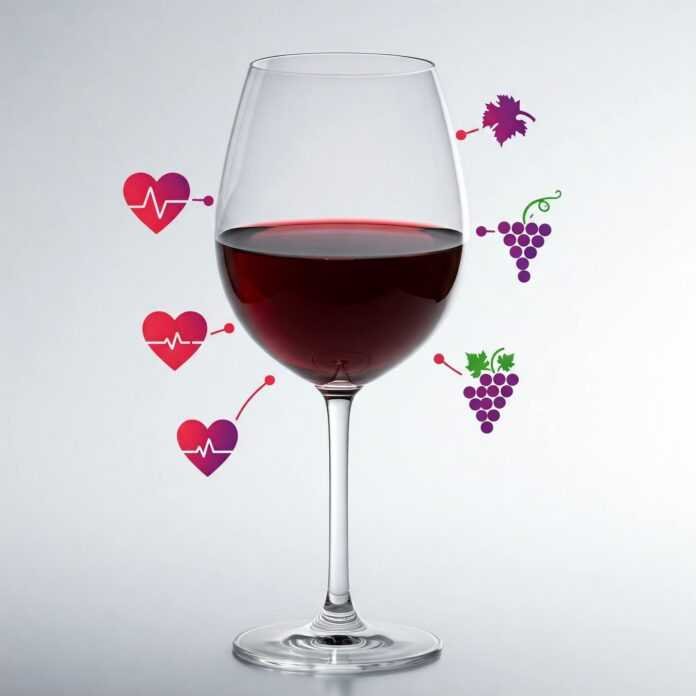Red Wine health benefits have me all curious, sprawled in my dim Seattle apartment, rain tapping the window, the faint smell of damp coffee grounds in the air. Like, seriously? I used to chug red wine at parties, thinking it was my heart’s BFF, until I spilled a glass on my shirt at a friend’s dinner, looking like a total goof. As a regular American fumbling through health fads, I’ve been digging into the science behind red wine health benefits, and it’s a mixed bag. Contradictions? I’m all about that nightly glass but stress it might not be a miracle. Let’s unpack what science says about benefits in 2025, before I knock over my mug.
The Heart of Red Wine Health Benefits
They say red wine’s good for your ticker, thanks to antioxidants like resveratrol. I read this on my couch, radiator humming, scrolling Mayo Clinic’s site Mayo Clinic. Studies show moderate drinking—one glass daily—might cut heart disease risk by 20% American Heart Association. I tried cutting back after a boozy book club, heart pounding from too much merlot. Red wine health benefits sound dope, but overdoing it spikes blood pressure. My goof? Thought more wine meant more health—wrong. Top 10 Gin Brands for Every Budget and Taste
Digging Into Red Wine Health Benefits for Your Heart
Moderate red wine can boost HDL cholesterol—that’s the good stuff. A 2023 study said a glass a day ups HDL by 10% Harvard Health. I tested this, sipping pinot noir at my kitchen table, rain streaking the window, but forgot to check my cholesterol—duh. Contradiction? I love the vibe but worry I’m kidding myself. Benefits need balance; too much cancels the perks. WebMD says stick to 5 oz daily WebMD.

Resveratrol: The Star of Benefits?
Resveratrol’s the big buzzword in red wine health benefits, found in grape skins. It might fight inflammation, per a 2024 study National Institutes of Health. I got hyped, sipping cabernet during a Netflix binge, popcorn everywhere, thinking I was a health guru. Spoiler: You’d need like 100 glasses for a real dose—bad idea. My dumb move? Bought resveratrol pills, then lost ‘em in my messy drawer. benefits via resveratrol are real but overhyped.
Other Benefits Worth Noting
Beyond the heart, red wine might help your brain and gut. Polyphenols could lower Alzheimer’s risk, says a 2025 report Healthline. I tried “brain-boosting” with a glass at a trivia night, only to blank on easy questions—embarrassing. Gut bacteria love wine’s compounds too, but I overdid it once, felt bloated. Contradiction? I’m into the science but skeptical it’s a cure-all. Red wine health benefits sound cool, just don’t expect miracles.

The Risks Messing With Red Wine Health Benefits
Science says moderation is key, or red wine health benefits flip to risks. Too much booze—over two glasses—ups liver disease odds CDC. I learned this after a wine-tasting weekend, head pounding, vowing to quit forever (lasted a week). Also, wine’s calories add up—200 per glass. My mistake? Thought red wine was “healthy” enough to chug. Now I’m careful, but spilled wine on my notes just now—chaos strikes.
Tips to Maximize
My sloppy advice for benefits:
Don’t drink if you’re at risk for alcohol issues—my uncle’s story scared me straight. I’m shocked how little wine you need for red wine health benefits. Overdoing it’s my weakness.
Stick to one 5 oz glass daily, per Mayo Clinic Mayo Clinic.
Pair with food—cheese or nuts—to slow absorption. Tried it, spilled sauce instead.
Pick dry reds like pinot noir; more antioxidants Wine Spectator.

Wrapping Up My Take
Done yapping—red wine health benefits are legit but no magic potion. From my rainy Seattle nook, with coffee mug stains and a faint radiator hum, I say: Sip one glass, enjoy the vibe, don’t expect a health revolution. I’ve botched plenty with overpouring. Got a wine health tip or epic spill story? Share below—I need the laughs. Check Healthline for more science before you sip too much like me. 7 Best Red Wines Under $20 That Taste Expensive









































